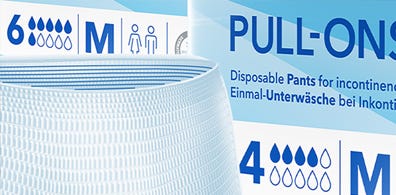Lifestyle Tips For Living With Incontinence



Living with incontinence can be a daily challenge. Whether it be rushing around trying to find a bathroom in time or forgetting incontinence products while you’re away from home, there are all sorts of problems you might face.
However, making some lifestyle adjustments can help you not only manage your condition more effectively but also boost your confidence in your daily life.
Understanding incontinence
There are a few different types of incontinence and they can each cause different problems.
The main types of incontinence include:
● Stress incontinence – urine leaks if your bladder is under pressure from coughing or laughing.
● Urgency incontinence – you feel the need to urinate urgently and you may leak before reaching the bathroom.
● Overflow incontinence – if you cannot fully empty your bladder, this can lead to frequent leaking.
● Functional incontinence – you are unable to get to the toilet on time.
● Mixed urinary incontinence – you have both urgency and stress incontinence symptoms.
● Neurogenic bladder dysfunction – bladder problems due to disease or injury to your central nervous system or peripheral nerves which help control urination.
Seeking medical advice for your incontinence is essential as your doctor will need to rule out any possible underlying conditions before putting you onto a personalised treatment plan.



Managing Incontinence
Learning different techniques and coping strategies is a vital part of living with incontinence. So let’s take a look at some of the most effective ways to manage your condition.
Lifestyle Adjustments
Lifestyle adjustments can be a good way to manage your symptoms. When it comes to your diet, try to avoid bladder irritants like caffeine which can make you more likely to experience urgency or leaks.
Staying hydrated is also important, but try to limit any fluid intake before bed to minimise your risk of nighttime leaks. Aim for six to eight glasses of fluid per day. If you have any underlying medical conditions, always check with your GP or healthcare professional how much you should be drinking.
Strengthening your pelvic floor muscles is another good way to reduce incontinence. Incorporate exercises designed for your pelvic floor, like Kegels, into your daily routine to help support bladder control.
Learn more about strengthening your pelvic floor with our online e-learning modules.
Being overweight can lead to a weakened pelvic floor and extra pressure on your bladder, increasing your risk of incontinence. As such, make sure to eat a well-balanced diet and exercise regularly to help maintain a healthy weight.
Practical tips for daily living
Dealing with incontinence means you will need to incorporate some practical tips into your day-to-day life to support your health and wellbeing.
Here are some of our main recommendations:
● Choose the right incontinence product for your needs – make sure you have the right level of absorbency and the right type of product for your body and symptoms.
● Always carry spare incontinence products and clothing with you when you leave the house.
● When at work or in a social setting, make sure to use the bathroom regularly to reduce the need for urgency or leaks.
● If you’re travelling, plan for breaks so you can go to the bathroom and always pack all the products you might need.
● When taking the train or plane, try to sit in an aisle seat so you can easily access bathrooms as many times as you need.
By planning proactively for your incontinence, you can find that your risk of leaks and urgency decreases. You’ll also feel prepared and confident for anything the day might throw your way.
Emotional support and coping strategies
Living with incontinence can be emotionally challenging. That’s why it’s so important to seek support from healthcare professionals and your loved ones.
Healthcare professionals can provide you with guidance and treatment options, while your loved ones can provide you with emotional support and understanding.
Coping with the potential embarrassment or stigma surrounding incontinence involves open communication. Talking about it is important, especially if you encounter a difficult situation or conversation. Understanding incontinence and sharing your knowledge with others can help break the stigma around it and let people know it’s okay to talk about it.
Online incontinence resources
There are lots of online resources available if you are dealing with incontinence. Some that can provide you with further support include Bladder & Bowel UK, Carers UK (continence care) and Bladder Health UK.
You can also use the Great British Toilet Map to look for public toilets whenever you’re next planning a trip or outing.
Maintaining a positive outlook
Maintaining a positive outlook when living with incontinence might seem easier said than done. But, by embracing self-care practices and prioritising your needs, you may feel a significant change in your mindset.
Try setting yourself realistic, achievable goals and always celebrate every victory – no matter how small.
Being proactive when managing your symptoms can provide you with a greater sense of control over your condition and help you keep feeling positive, despite living with incontinence.
Effectively managing incontinence involves making lifestyle changes and seeking support when you need it. Being proactive with your symptoms by planning ahead and incorporating healthy foods, exercises and routines can also help support you on a daily basis.



Explore incontinence products with Attends
At Attends, we understand that your incontinence needs are unique which is why we offer a wide range of incontinence products.
Our daily solutions have been supporting people with incontinence for 40 years and now, thanks to our highly specialised range of products, you can easily find something that works for you.
Explore the complete range of Attends incontinence products.

Sexual Health & Incontinence

Which Medications Can Cause Incontinence?

Incontinence in Young Women: Key Causes

Nocturia & Nocturnal Enuresis (Adult Bedwetting)

How To Stop Urine Leakage When Coughing



